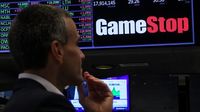GameStop Corp. is once again at the center of the financial spotlight, as the New York Stock Exchange (NYSE) imposed a Short Sale Restriction (SSR) on the company following a dramatic spike in short sales volume. On March 27, 2025, GameStop's short sales volume surged by 234%, reaching a staggering 30.85 million shares sold. This surge came on the heels of a significant announcement by the retailer, which plans to raise $1.3 billion through convertible bonds to invest in Bitcoin.
The SSR is triggered when a stock drops more than 10% from its previous closing price, and on that day, GameStop's stock plummeted by 22%, wiping out a previous 12% gain attributed to speculation about the company's involvement in the cryptocurrency market. At the time of publication, GameStop (GME) was trading at $22.09, according to Google Finance data.
Kevin Malone, president and CEO of Malone Wealth, expressed skepticism about the trading activity, noting in a post on X that "GameStop traded 50x more shares today than last Thursday. Not statistically possible without naked short-selling." This was a clear reference to the controversial practice of selling shares that have not been borrowed, which has raised concerns among investors.
The trading volume on March 27 was reminiscent of the infamous short squeeze in January 2021, when GameStop's stock skyrocketed due to a coordinated buying effort by retail investors, resulting in significant losses for hedge funds and other short sellers. The peak of that short squeeze saw 33.26 million shares traded on January 19, 2021. However, the latest trading day fell short of this record.
In an effort to bolster its financial position, GameStop announced that it would issue convertible senior notes, a type of debt that can later be converted into equity, to fund its Bitcoin acquisition strategy. This move comes after the company reported a decline in sales and a need to optimize its store portfolio. GameStop has already closed nearly 600 stores in the U.S. and shuttered operations in several international markets during its 2024 fiscal year.
The company has stated that it will use the proceeds from the bond issuance for general corporate purposes, including acquiring Bitcoin as a treasury reserve asset. This decision has drawn comparisons to the strategy employed by MicroStrategy, a company that has successfully amassed a significant Bitcoin holding. However, analysts have expressed skepticism about GameStop's ability to replicate this success, citing the company's lack of solid fundamentals.
Analyst Tom Sosnoff remarked that GameStop's approach to purchasing Bitcoin feels "a little dot-comish," suggesting that the company might be jumping on the cryptocurrency bandwagon without a clear strategy. Meanwhile, Bret Kenwell, a U.S. investment analyst at eToro, echoed these sentiments, stating that "investors are not necessarily optimistic on the underlying business."
Despite the challenges, GameStop is pushing forward with its Bitcoin strategy, which it believes will enhance its market position. The issuance of 46 million new shares as part of the convertible note offering will increase its cash reserves to $6.1 billion. However, this has raised concerns about potential dilution of existing shareholders, which could further impact the stock price.
As the market reacted to these developments, GameStop's stock saw significant volatility. Following the announcement of the bond offering, shares initially rose by 11.6% but then fell sharply by more than 20% on March 27. This marked the company's steepest single-day loss since June 2024, highlighting the uncertainty surrounding its future.
GameStop's latest financial report revealed a net sales decline to $3.82 billion for fiscal 2024, down from $5.27 billion the previous year. However, the company reported improved profit margins, with net income more than doubling to $131.3 million from $63.1 million over the last 12 months. This improvement came amid reduced operating expenses, indicating that while sales were down, the company was managing its costs more effectively.
As analysts continue to scrutinize GameStop's strategy, the implications for its stock price remain uncertain. The company is heavily reliant on speculation, and its future largely hinges on the success of its Bitcoin investment and the broader market's reaction to this pivot. If Bitcoin prices rise significantly, it could lead to a short squeeze, driving share prices higher.
In the midst of these changes, GameStop is also planning to close a "significant number" of stores based on current market conditions and individual store performance. The company currently operates 3,203 stores worldwide, with 2,325 located in the U.S. Ohio, for instance, has 139 GameStop locations, making it the fifth-highest state for GameStop stores.
As GameStop navigates this turbulent landscape, the question remains: can it successfully leverage its Bitcoin strategy to revitalize its business model, or will it fall victim to the same volatile trends that have plagued it in the past? The coming months will be critical as the company attempts to balance its ambitious plans with the realities of the market.






